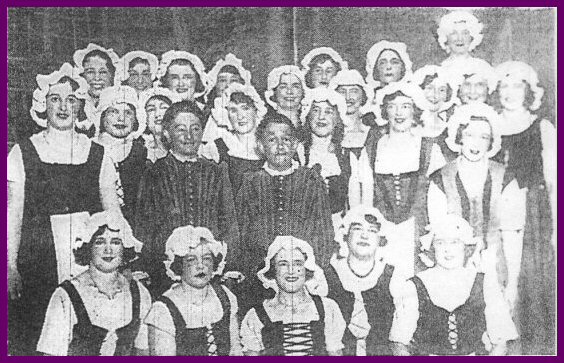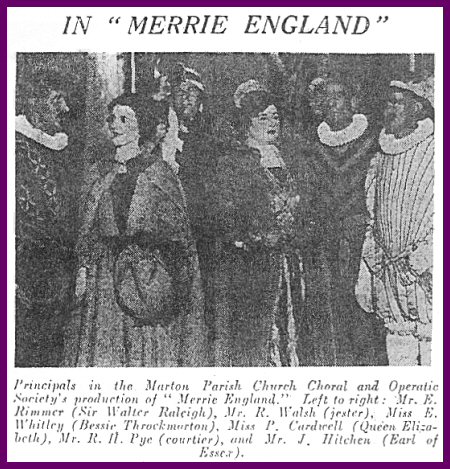|

The Marton Parish Church
Choral and Operatic Society are presenting their numerous admirers
with further light opera this week again under the watchful eye
of Mr. Stanley Jenkinson, whose gifts as a producer have never been
more successfully applied, writes "Musica."
The
commodious Parochial Hall, an enlarged stage, scenery painted by
the members of the Society, an orchestra of real merit, and an enthusiastic
audience provided all the essentials for success on Wednesday night
- the opening night of a series of four, which closes to-night.
It was a pleasant experience to hear Edward German's
light opera "Merrie England," in its proper environment,
and with the players in the costumes of the period when the Earl
of Essex and Sir Walter Raleigh roamed through Windsor Forest in
the heart of mediŠval England, with the Thames flowing placidly
by.
One has become so accustomed to hearing this
straightforward and thoroughly English melody in the concert version
that a new freshness and vitality - due to scenic effects, the Mayday
revels, the appearance of the dragon and Herno the Hunter - is given
to the music of a man who, it is hard to realise, is now 70 years
of age, and which was written so long as thirty years ago.
They
are a happy and industrious band at Marton - hard work and enthusiasm
is second nature to them. They respond to the demands of their musical
director - Mr W. Hogarth - with commendable zeal, and only very
occasionally was the acton slightly held up on the opening night
through misunderstanding: a real tribute to all concerned. The
team spirit is well upheld.
The cast is generally
good, with an attractive and vocally captivating pair of artists
in Miss E. Whiteley (Bessie) and Miss R. Hill (Jill-all-alone),
a dignified Queen Elizabeth in Miss P. Cardwell, employing a good
voice and commanding presence, and a May Queen (Mrs. W. Calvert),
whose experience counts for a great deal.
A.
Howarth and J. Gibson (players in Shakespeare's company) are successful
in their infectious comedy parts as Wilkins and Simkins respectively.
Unfortunately, E. Rimmer is unable, owing to indisposition,
to get as much out of the part of Raleigh as would otherwise have
been the case. Still, his happy personality makes his
impersonation effective, while the Earl of Essex, played by J. Hitchen,
has a great many points of interest.
The Long Tom
and Big Ben of F. Wade and J. H. Atherton respectively are characteristically
successful, while the four industrious men of Windsor enliven the
proceedings exceedingly. They are well impersonated
by J. Wade, W. Turner, W. Calvert, and F. Smith.
R.
Walsh, as the Queen's Fool, Masters H. Spiby and F. Washington,
and Misses F. Sanderson, R. Cookson and P. Banham fill minor roles
with adaptability.
The well-drilled chorus moves
naturally - there is no appearance of either haste or clumsiness,
in spite of limited space, and they sing their choruses very well
indeed: here is still another department where good training is
apparent...
The Masque of St. George and the Dragon,
the Egyptian dance (very artistic), Elizabeth's song, "O Peaceful
England"; Jill's song, "Where the deer do lie", Bessie's
ballad, and the big brass band number are worthy of special mention.
Mrs Oscar Howarth has been an invaluable help in matters
of make-up, etc., and Mr. Charles Frost an exemplary stage manager
and accessory to Mr. Stanley Jenkinson - a "Job" among
producers.
|


